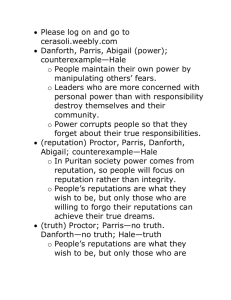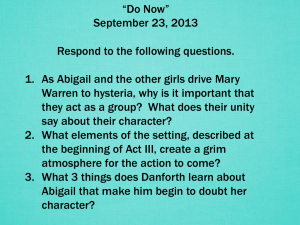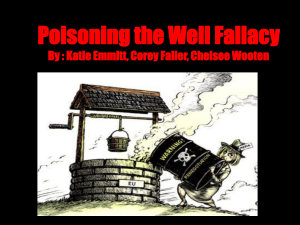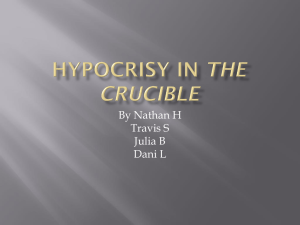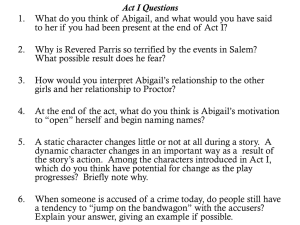The Crucible Act IV: Study Guide & Questions
advertisement
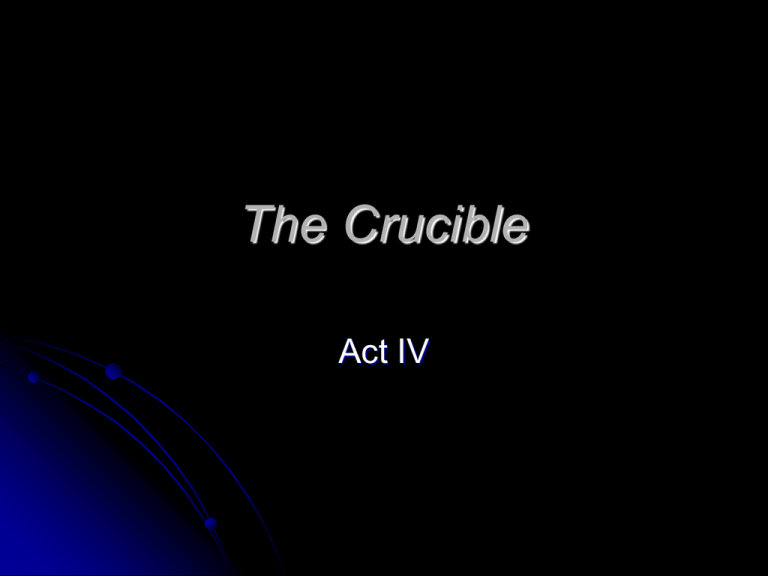
The Crucible Act IV 1. In the beginning of Act Four, how does the author indicate the passage of time? With reference to fall in the first stage direction 2. Summarize the conversation between Herrick, Good, and Tituba. What does this show about the mental state of the prisoners? Tituba and Good think a cow is the devil coming to take them home They seem out of their minds and illtreated 3. For what purpose does Reverend Hale return? He returns to try to convince Nurse, Corey, and Proctor to give false confessions in order to save their lives. 4. How do Danforth and Hathorne feel about Hale’s return? They see him as a threat since he quit the court 5. What explanation does Cheever give for Parris’ nervous behavior? Do you think this is the cause? What else could cause Parris to act nervous? He thinks Parris is nervous because of the livestock wandering the streets and the poor state of the community Parris is probably nervous because he knows when word gets out that Abigail left town people will realize she was a fraud and come after Parris 6. What news of Abigail does Parris share with Danforth? She robbed him and skipped town with Mercy 7. Why is the news regarding Abigail of particular concern to the court? It shows that she was a fraud 8. Rumors of rebellion in nearby Andover have worried Parris. Why? Of what is he afraid? Are his fears well founded? He thinks the same thing will happen in Salem and that the town will turn on him. He has already had threats so he probably has reason to be afraid. 9. Compare the previously executed prisoners with those remaining to be executed. How do they differ? The previously executed were people of low standing in the community Proctor, Nurse, and Corey are respected 10. Does Parris care about the souls of Rebecca, Martha, and John? Why does he want them spared? Parris doesn’t really care about their souls He is just worried for his own safety. 11. It has been said that Danforth is more concerned with upholding the court than uncovering the truth. What evidence supports that statement? His willingness to accept a confession that is obviously false as long as he can nail it to the church door. 12. Describe Salem as it exists in Act Four. What impact have the executions had on this village? Livestock and orphans wander the streets and crops are rotting The town is in disarray 13. For what reason is Elizabeth brought in to talk to John? They hope that she can convince him to confess 14. What news of Giles does Elizabeth share with John? He was pressed to death with heavy stones and refused to give the name of his informant. 15. In addition to integrity, what other purpose did Giles have in not revealing his source of information? By not saying yes or no, his property was able to be passed down to his son. 16. Proctor tells Elizabeth that he is considering confessing because, “Nothing’s spoiled by giving them this lie that were not rotten before.” To what is he referring? Do you agree with his logic? This won’t be the first lie he had told in his life and he is already a sinner discuss 17. For what does Elizabeth apologize? She apologized for not knowing how to express her love and for keeping a “cold” house. 18. Why does Proctor decide to confess? He wants his life 19. At first, Danforth is not satisfied with Proctor’s confession. What other information does he want Proctor to give? Why does Proctor refuse to cooperate with this wish? He wants Proctor to name names and implicate Nurse and Corey Proctor will not condemn his friends 20. Describe Rebecca’s reaction to John’s confession. What keeps Rebecca from confessing? What does this reveal about her character? She is disappointed and shocked She is a good Puritan woman who will not tell a lie She is true to her beliefs 21. John doesn’t want his confession posted on the church door. Why? He thinks of the shame it would bring his family if he sold out in this way 22. Why does Proctor tear the confession? What does this act signify? He realized that it isn’t the right thing to do It signifies that he has come to peace with the situation and knows what is right 23. Why is Parris frantic in the end of the play? What does he fear? He is worried the town will turn on him 24. Elizabeth closes the play with the following line: “He have his goodness now. God forbid I take it from him.” What does she mean? She means that he made the right choice and God will look kindly on that As much as she wants him living, she cares about his soul and thinks that now he has a chance for salvation. 25. Hale, like Parris, is visibly upset in the closing scene. In what way does his sadness differ with that of Parris? Hale truly feels for the victims and knows that a terrible wrong has been committed Parris is just scared for his own safety.




